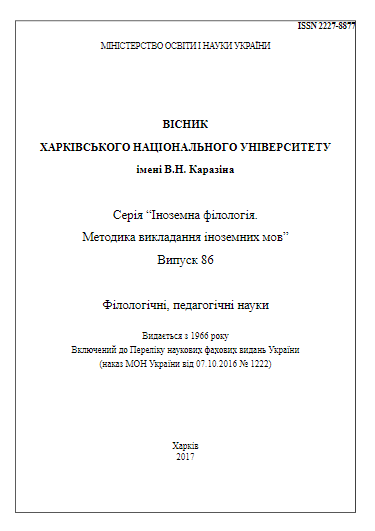Квазіреалія як засіб об’єктивації фантастичної картини світу та особливості її перекладу (на матеріалі казки Р. Дала «Чарлі і шоколадна фабрика»)
Анотація
Художній твір як вербальне втілення концепції письменника є відображенням авторської картини світу, що об’єктивується в текстовій тканині за допомогою мовних та образних засобів, вибір яких завжди обумовлений авторським задумом та спрямований на передачу конкретного образу чи думки. Репрезентантами індивідуально-авторської картини світу зазвичай виступають елементи, які за своїми мовними властивостями найбільш яскраво відтворюють авторське розуміння дійсності, реалізуючи прагматичні установки його творів. Система авторських мовних засобів є вираженням творчої індивідуальності письменника та його особливого світогляду, що дає змогу лінгвально інтерпретувати маркери мовної особистості письменника та засади формування його авторського кредо. Фантастичній картині світу як формі репрезентації квазіреальної дійсності у вигаданому географічному просторі притаманні численні ознаки, що відрізняють її від реальної дійсності. У статті проана-лізовано використання квазіреалій як засобу об’єктивації фантастичної картини світу на матеріалі казки Р. Дала «Чарлі і шоколадна фабрика» та особливості їх перекладу українською та німецькою мовами. Збереження у перекладі граматичної та семантичної цілісності авторських новотворів вимагає від інтерпретатора звернення до макроконтексту, застосування різного роду перекладацьких трансформацій та ретельного вивчення індивідуального стилю автора, що ставить його перед нелегким вибором варіантів, пов’язаних з найменшими втратами. Порівняльний аналіз перекладу квазіреалій українською та німецькою мовами, відмінними за своїми типологічними та національними характеристиками, дозволить дослідити адекватність відтворення індивідуального стилю Р. Дала та особливостей фантастичної картини світу його дитячих творів.
Завантаження
Посилання
Кашкин В.Б. Сопоставительная лингвистика / В.Б. Кашкин. – Воронеж : Воронежский государственный университет, 2007. – 88 с.
Кубрякова Е.С. Языковое сознание и языковая картина мира / Е.С. Кубрякова // Филология и культура: тезисы межд. конф. – Тамбов : ТГУ им. Г.Р. Державина, 1999. – С. 6-13.
Морева Т.Ю. Фантастические повести В.Ф. Одоевского и О. Стороженко (мифомышление как проявление национального сознания) [Электронный ресурс] / Т.Ю. Морева. – Режим доступа : http://dspace.onu.edu.ua:8080/bitstream/123456789/ 8592/1/320-331.pdf.
Неелов Е.М. Фантастический мир как категория исторической поэтики [Электронный ресурс] / Е.М. Неелов. – Режим доступа : http://philolog.petrsu.ru/filolog/konf/ 1990/04neyolov.htm.
Ребрій О.В. Сучасні концепції творчості у перекладі : [монографія] / О.В. Ребрій. – Х. : ХНУ імені В.Н. Каразіна, 2012. – 376 с.
Тіліга А.Ю. Відтворення топоніміки як складової фантастичної художньої картини світу в англо-українських перекладах [Електронний ресурс] / А.Ю. Тіліга. – Режим доступа : http://essuir.sumdu.edu.ua/ bitstream/123456789/ 25316/1/Tiliga.pdf.
Чуковский К.И. Высокое искусство / И.К. Чуковский. – М. : Советский писатель, 1968. – 384 с.
Щирова И.А. Многомерность текста: понимание и интерпретация / И.А. Щирова. – СПб. : ООО «Книжный Дом», 2007. – 472 с. 10. English Oxford living Dictionaries [Electronic resource]. – Access : https://en.oxforddictionaries.com/definition.




